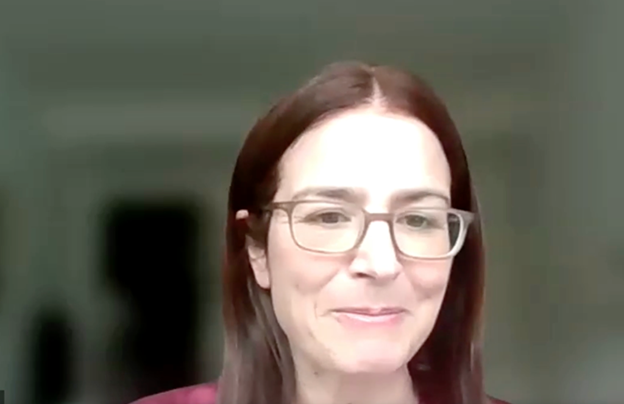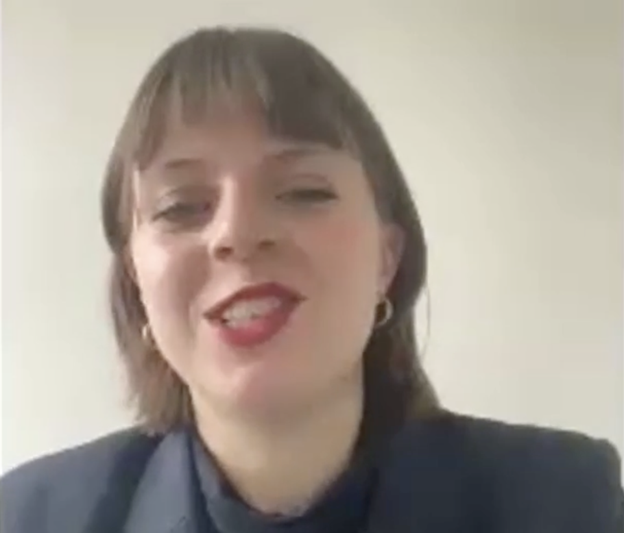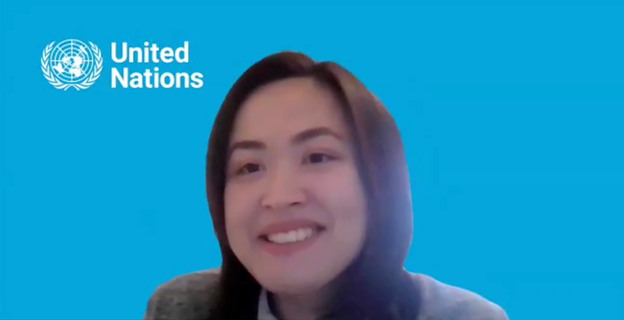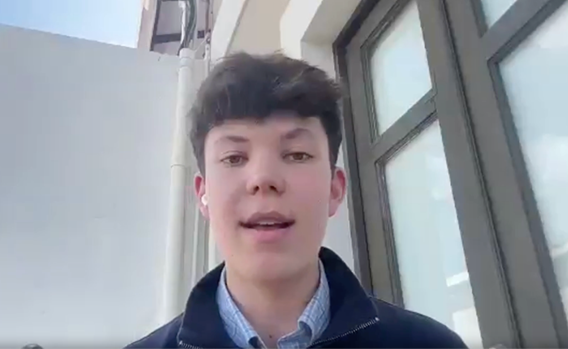
Disarmament is critical to the United Nations’ mission for a peaceful world. As the UN Secretary-General António Guterres, described, it is the "DNA of the United Nations." From threats to use nuclear weapons being thrown around to guns fueling armed conflict, the threat that all weapons pose to humanity has never been greater since the Cold War. 5 March 2024 marked the second International Day for Disarmament and Non-Proliferation Awareness (IDDNPA). It is fitting, then, that the first webinar for the United Nations Youth Champions for Disarmament training programme was held just a day before. Out of around 1,000 applications, 15 youths were chosen from around the world. We all come from different backgrounds. A doctor, a poet, artists, and community leaders, joining together to champion disarmament in our respective regions.
Ms. Radha Day, Chief of the Regional Disarmament, Information and Outreach Branch at the United Nations Office of Disarmament (UNODA) reminded us of this opportunity in her welcoming remarks. She began with a striking quote from the Secretary-General, noting that the IDDNPA arrives “at a perilous moment, marked by rising levels of military spending, deepening geopolitical tensions and growing violent conflicts across the globe.”
In a time when disarmament and non-proliferation are made “critical not only to a peaceful future, but to our very existence”, Ms. Day emphasized the value of the UN Disarmament Youth Champions programme which would focus on the principles of disarmament and non-proliferation as they relate to the broader tenets of sustainable development.
In particular, the linkages between disarmament and the Sustainable Development Goals (SDGs) are unmistakable. SDG 16: Peace, Justice, and Strong Institutions, underscores the importance of promoting peaceful and inclusive societies for sustainable development. Disarmament lays the groundwork for fostering a culture of peace, wherein the dividends of development can flourish unimpeded by the scourge of violence and insecurity. These current threats undermine the very fabric of a peaceful, inclusive, and sustainable society and disproportionately affect vulnerable groups, including women, youth, and children. Moreover, the illicit arms trade exacerbates conflict, perpetuates human rights abuses, and impedes socioeconomic progress. By curbing the flow of arms, we can mitigate these deleterious effects and pave the way for sustainable peace and development. This underscores the imperative of implementing existing disarmament treaties and strengthening international cooperation in arms control and non-proliferation efforts.
At the heart of these collective aspirations lies the United Nations Youth, Peace, and Security (YPS) Agenda, which acknowledges the pivotal role young people play in promoting peace and security worldwide.
Mr. Matthew Bolton, moderator of the webinar, also affirmed the role of disarmament in society at large. Matthew is a Professor of Political Science and the Co-Director of the International Disarmament Institute at Pace University. Additionally, he was part of the International Campaign to Abolish Nuclear Weapons (ICAN), which was awarded the 2017 Nobel Peace Prize. He spoke on the links between disarmament and sustainable development in connection to various aspects of our society, especially in terms of approaching emerging technology, protecting the environment, and strengthening equity.

“Disarmament is about trying to secure the future,” Mr. Bolton said. In the process of working to achieve disarmament, and thus ensuring that everyone’s basic human rights are respected, he stressed the role of youth. Youth can empathize with those marginalized from political systems and are often in step with technological innovation, which allows us to effectively utilize social media and demystify disarmament in creative ways.
Our first speaker was Ms. Gizem Sucuoglu, Senior Political Affairs Officer and Special Assistant to the High Representative for Disarmament Affairs. She continued the emphasis on the role of disarmament in working towards broader agendas. Having contributed extensively to A New Agenda for Peace, she highlighted the fact that it brought disarmament to the forefront of the UN's peace and security pillar.

In a time when States are “losing faith in multilateralism and UN’s ability to deliver,” Ms. Sucuoglu noted the need for multilateral collaboration, exemplified by the Summit of the Future. To be held later this year, the Summit will call for collaboration towards a Pact of the Future, with a strong focus on youth and future generations.
Ms. Alice Filiberto, Vice Chair of Youth for the Treaty on the Prohibition of Nuclear Weapons (TPNW) and Programme Manager for Roadshows and Outreach Projects at the Middle East Treaty Organization (METO), took up the baton to speak on the role of youth in international collaboration.

“Youth have a major responsibility,” she said, for what we want to see in our lives in the near and far future. Working for Youth4TPNW, Ms. Filberto shared her experience in facilitating the involvement of youth within “contexts where decisions are made”. She underscored the importance of looking at disarmament from a broader societal perspective, stating that disarmament initiatives must involve people from various places around the world in order to enrich the global narrative.
Having started her work outside the UN, and now serving as the UN Youth Office ’s specialist in YPS, Ms. Racquel Correa elaborated on the role of grassroots organizations and youth.

“When the UN Security Council adopted its first-ever resolution on YPS,” Ms. Correa said, “some of the youth who advocated for [its] adoption had disarmament backgrounds.” Just as these youth brought in their experiences and lessons learned from advocating for the Arms Trade Treaty, she said, it is important not to see disarmament and YPS in silos. While disarmament is often seen as something “technical and niche,” it is, in fact, an essential part of YPS and connected to the YPS agenda through one of the five key pillars of Resolution 2250, specifically the pillar on disengagement and reintegration.
She also urged the significance of a holistic approach to capacity-building for young people on peace and security issues, something she has been working towards in Southeast Asia. “For example, when a training is developed to build the skills of young people on mediation and negotiation" she said, "for young people to participate in peace processes, it is also essential to build their knowledge and skills on disarmament, protection and safe engagement."
As a young person with experience in disarmament research, Mr. Michael Murray spoke to us about his experience in Georgetown International Research Group, whose research on youth mainstreaming in small arms and light weapons control was published by the International Action Network on Small Arms (IANSA).

“Youth are disproportionately affected by small arms violence,” he said, “but underrepresented in [government policy-building].” Like Ms. Correa, Mr. Murray stressed the importance of youth mainstreaming. At the same time, he advised that the conversation must center not only on the future role of youth but also on the impacts youth have already made.
In a lively Q&A, the Youth Champions demonstrated curiosity on the role and empowerment of youth in disarmament. This ranged from youth’s potential in disarmament research to the power of youth advocacy movements in resonating with diverse audiences.
Concluding our first webinar, the Youth Champions moved into breakout rooms for discussion. The perspectives of professionals in the disarmament field, together with the passionate exchange of ideas within our discussion groups, inspired us to continue our efforts towards promoting disarmament. The multiregional aspect of the programme was at play, as the Champions got to share their views on such interconnectedness from their experience and their local realities. Having received much affirmation on the vital role of disarmament in the world’s sustainable development, we, as Youth Champions, believe that critical initiatives like this disarmament programme will build the foundation for youth to act as bridges between communities and global issues.